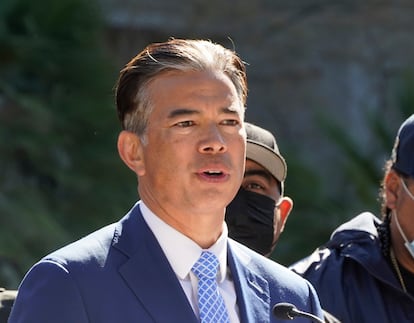California sues district that requires parents be notified if their kids change pronouns
Attorney General Rob Bonta says the policy amounts to ‘forced outing’ of transgender students and violates their civil rights and the state constitution

California’s attorney general sued a Southern California school district Monday over its recently adopted policy that requires schools to notify parents if their children change their gender identification or pronouns. Attorney General Rob Bonta said he filed a lawsuit against the Chino Valley Unified School District over the policy that mandated this notification, calling it a “forced outing” of transgender students that violates their civil rights.
“It tramples on students’ rights,” Bonta told reporters. He said he is seeking a court order to immediately halt the policy from taking effect.
The move comes after Chino Valley Unified, about 35 miles (56 kilometers) east of Los Angeles, adopted the policy following a shift in leadership on the school board. Other Southern California districts have adopted similar policies and Bonta said he believes they will also be affected by this litigation, though they are not named in the suit.
The suit argues the policy discriminates against transgender and gender non-conforming students and violates the state constitution which requires equal protect for all students regardless of their gender expression, identity or sexual orientation. It also argues the policy violates students’ privacy rights.
“For far too many transgender children and gender-nonconforming youth, school serves as their only safe haven — a place away from home where they can find validation, safety, privacy. We have to protect that,” Bonta said.
The policies have sparked divisions in communities between those who say parents have a right to know the decisions their children are making at school and those who say that such policies would forcibly out transgender students to their parents and threaten the well-being of some of the most vulnerable students.
Andi Johnston, a spokesperson for Chino Valley Unified, said the district is working with its attorneys to review the lawsuit. Before the filing, district officials had been working to provide Bonta’s office with requested documents and records in response to a subpoena served earlier this month, Johnston said.
The fight over the proposed school district policies in Southern California come as states across the country are battling over transgender rights through efforts to impose bans on gender-affirming care, bar trans athletes from girls and women’s sports, and require schools to “out” trans and nonbinary students to their parents.
Earlier this year, California Republican Assemblymember Bill Essayli introduced legislation to require teachers to notify parents if their child identifies as a gender different from their birth certificate or uses facilities designated for another gender. But the bill never received a hearing.
“That’s when I shifted my focus and started working with school board members to craft local district policies,” he said.
He worked with the California Family Council and other groups to help draft the policy that was voted on at Chino Valley.
Critics of the policies are concerned that it could pose a risk to students who live in households that are not accepting or abusive.
“There’s a lot of systems in place to deal with physical abuse of any minor, and I think it’s wrong for the state to presume that parents are a danger and therefore take a blanket policy where they’re going to withhold information from all parents under the auspice that some parents might be harmful to their kids,” Essayli said.
Teachers are required to report abuse if they become aware of it, he said.
Sign up for our weekly newsletter to get more English-language news coverage from EL PAÍS USA Edition
Tu suscripción se está usando en otro dispositivo
¿Quieres añadir otro usuario a tu suscripción?
Si continúas leyendo en este dispositivo, no se podrá leer en el otro.
FlechaTu suscripción se está usando en otro dispositivo y solo puedes acceder a EL PAÍS desde un dispositivo a la vez.
Si quieres compartir tu cuenta, cambia tu suscripción a la modalidad Premium, así podrás añadir otro usuario. Cada uno accederá con su propia cuenta de email, lo que os permitirá personalizar vuestra experiencia en EL PAÍS.
¿Tienes una suscripción de empresa? Accede aquí para contratar más cuentas.
En el caso de no saber quién está usando tu cuenta, te recomendamos cambiar tu contraseña aquí.
Si decides continuar compartiendo tu cuenta, este mensaje se mostrará en tu dispositivo y en el de la otra persona que está usando tu cuenta de forma indefinida, afectando a tu experiencia de lectura. Puedes consultar aquí los términos y condiciones de la suscripción digital.








































